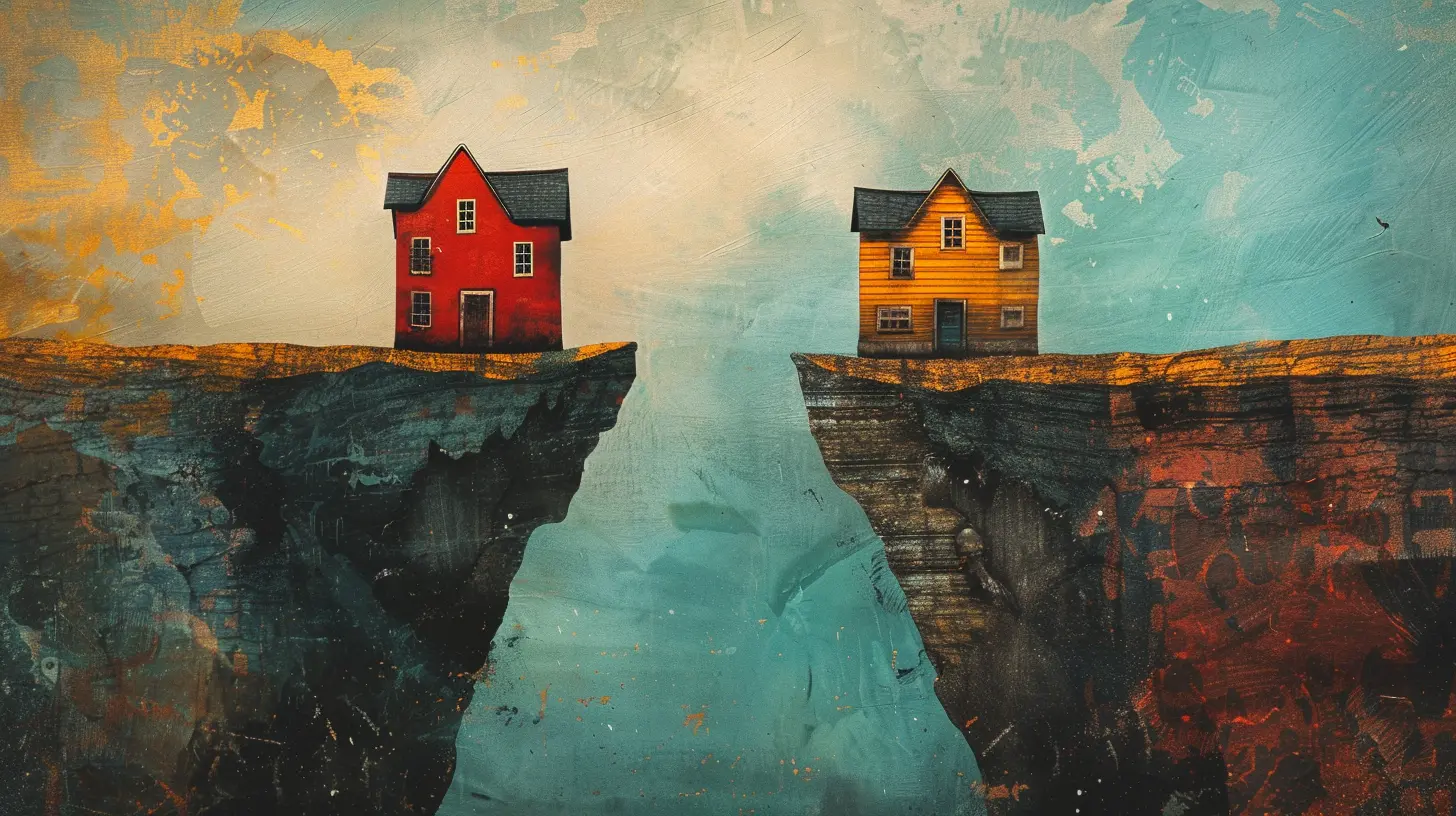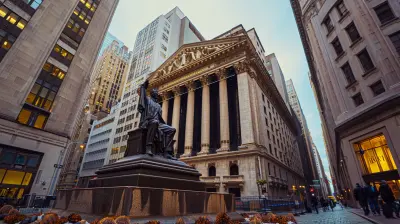Property Ownership and Its Role in the Wealth Divide
12 October 2025
Owning property—it’s a dream for many, a benchmark of success, and often seen as the ultimate adulting badge. But what if I told you that this dream, while sweet for some, is a massive contributor to one of today’s nastiest financial realities—the wealth divide?
Yep, that’s right. Property ownership isn't just about white picket fences and backyard barbeques. It’s actually a loaded weapon in the battle between the haves and the have-nots. Let’s dive into how owning a piece of land or a home can shape someone's financial future—and why it’s leaving others behind.

The Foundation of Wealth: Why Property Matters
Let’s keep it real: wealth isn’t just about how much money you make. It’s about what you own. And in most cases, property is the heavyweight champion of wealth-building.When you own a home, you’re not just living in it. You're investing in an asset that (usually) grows in value over time. That growth? Pure equity. And equity equals wealth.
Think of homeownership as a financial snowball. It starts small, but over time—thanks to rising property values and paying down your mortgage—it turns into something massive. And for many families, that’s the biggest source of their net worth. We’re talking generational wealth here.
But here’s the kicker—not everyone has access to that snowball.

A History Lesson: Inequality Is Baked In
Let’s rewind a few decades. Property ownership has always been a key ingredient in the wealth recipe, but access to it? Well, that hasn't exactly been equal.Remember redlining? It was a discriminatory practice where banks and governments marked certain neighborhoods—often predominantly Black and low-income—as “risky” for investment. That made getting a mortgage almost impossible for the people living there.
Even after redlining was outlawed, its effects lingered. Communities that were excluded from property ownership missed out on decades of appreciation. Meanwhile, other families were stacking wealth, passing it down, and gaining even more financial advantages.
This historical head start created a gap that’s still very much alive today.

Fast Forward to Today: Who’s Winning?
Let’s break down some cold, hard truths.- Homeownership rates vary wildly by race and income. According to recent data, around 74% of white households own homes compared to just 45% of Black households and 48% of Hispanic households.
- Millennials and Gen Z? They're buying less and much later, thanks to student loans, wage stagnation, and—you guessed it—sky-high home prices.
- Low-income families? The dream of ownership often stays just that—a dream. With rising rent prices, saving for a down payment is like chasing a moving train.
Those who own property are seeing their wealth grow, while those who don’t are falling further behind. It’s not just a gap—it’s a chasm.

Renting vs. Owning: The Wealth-Building Game
Okay, renting has its perks—flexibility, fewer responsibilities, and no surprise repair bills. But let’s talk numbers.When you rent, your monthly payment builds your landlord’s equity, not your own. You're essentially paying off someone else’s mortgage (and they’re thanking you for it). Meanwhile, homeowners are building wealth month after month just by living in their homes.
Let’s say you bought a $250,000 home 10 years ago. With average appreciation, it could be worth $400,000 today. That’s $150,000 in equity, not including what you’ve paid on your mortgage. Renters? They’ve paid just as much or more, but have zilch to show for it.
It’s like running on a treadmill while homeowners get to ride the escalator.
Generational Wealth: The Power of Passing It On
One of the biggest perks of property ownership? The ability to pass it down.When a parent owns a house and leaves it to their kids, that’s a major financial head start. Imagine inheriting a home that’s paid off or nearly there. Suddenly, your living costs shrink. Maybe you can afford college without loans. Or you sell the house and use the money to start a business. Boom—life changed.
But for families who never owned property? There’s nothing to pass on. The cycle continues.
This is how property ownership creates generational divide. It’s like one family is playing Monopoly with hotels, while the other keeps landing on rent.
The Role of Housing Policy
Let’s not get too cynical—certain policies are trying to level the playing field. Programs for first-time homebuyers, subsidized housing, and affordable mortgage options are a step in the right direction.Still, the system has built-in advantages for existing homeowners:
- Tax breaks on mortgage interest and property taxes
- Access to home equity loans (hello, low-interest cash!)
- Higher net worth, leading to easier access to credit
In contrast, renters get... well, almost nothing. And it’s incredibly hard to break in unless you already have a strong financial foundation.
The Investor Effect: When Homes Become Assets, Not Shelter
Another player in today’s wealth divide? Real estate investors.Big investors and corporations are snatching up homes, especially in hot markets. They rent them out or flip them for profit. While great for them, it means fewer homes available for regular folks trying to buy their first home.
When homes are seen as investment opportunities more than places to live, prices soar. Regular buyers can’t keep up. Investors win, the average Joe loses.
Is it fair? Not really. But it’s today’s reality.
The Price of Location: Where You Live Matters
Let’s not forget geography. Buying a home in a high-growth area is like hitting the jackpot. Cities like San Francisco, New York, or Seattle? Property values there have gone through the roof.But if you’re stuck in an area with declining property values or economic stagnation, your house might not appreciate at all. Worse, it could lose value.
Not all homeowners are winning equally. Where you buy matters just as much as what you buy.
The Racial Wealth Gap and Housing
Housing isn’t just a side issue in the racial wealth gap—it’s center stage.Because white families historically had better access to property ownership, they’ve accumulated more wealth over generations. Black and Hispanic families, on the other hand, were often locked out due to systemic barriers.
Even today, Black homeowners face lower home values, higher mortgage rates, and more frequent rejection from lenders.
This isn’t about personal choice—it’s about deeply rooted structural inequality.
So, What Can Be Done?
First, let’s be honest—fixing the wealth divide tied to property ownership isn’t going to be easy. But it’s not impossible either.1. Expand Access to Affordable Housing
Policies that support more affordable housing can help first-time buyers get a foot in the door. Think down payment assistance, low interest rates, and community land trusts.2. Crack Down on Discriminatory Lending
Fair lending needs to be the standard, not the exception. Lenders should be held accountable for any biased practices.3. Encourage Financial Literacy
Many people want to own a home but don’t know where to start. Education around credit, savings, and real estate can be a game-changer.4. Regulate Real Estate Investors
Putting limits on institutional investors or offering perks to owner-occupiers can help reduce the squeeze on the housing market.5. Tax Reforms
Modify tax benefits so they don’t only help wealthy homeowners. Renters should get some love too!Final Thoughts
Property ownership is more than just a place to live. It’s a financial power tool. For those who have it, it builds wealth, offers stability, and opens doors to future opportunities. But for those who don’t, it’s often a symbol of what they’re missing—and a major driver of the growing wealth divide.The bottom line? If we want to bridge the wealth gap, we have to start with how we think about, regulate, and enable property ownership.
Until then, the rich will keep getting richer—one mortgage payment at a time—while everyone else falls further behind.
all images in this post were generated using AI tools
Category:
Income InequalityAuthor:

Zavier Larsen
Discussion
rate this article
1 comments
Nora McNab
Property ownership is a powerful tool for wealth creation and stability. By addressing barriers and promoting equitable access, we can bridge the wealth divide and empower all individuals to build a brighter financial future!
October 12, 2025 at 2:59 AM

Zavier Larsen
Thank you for your insightful comment! I completely agree—promoting equitable access to property ownership is crucial for fostering wealth creation and reducing disparities.


